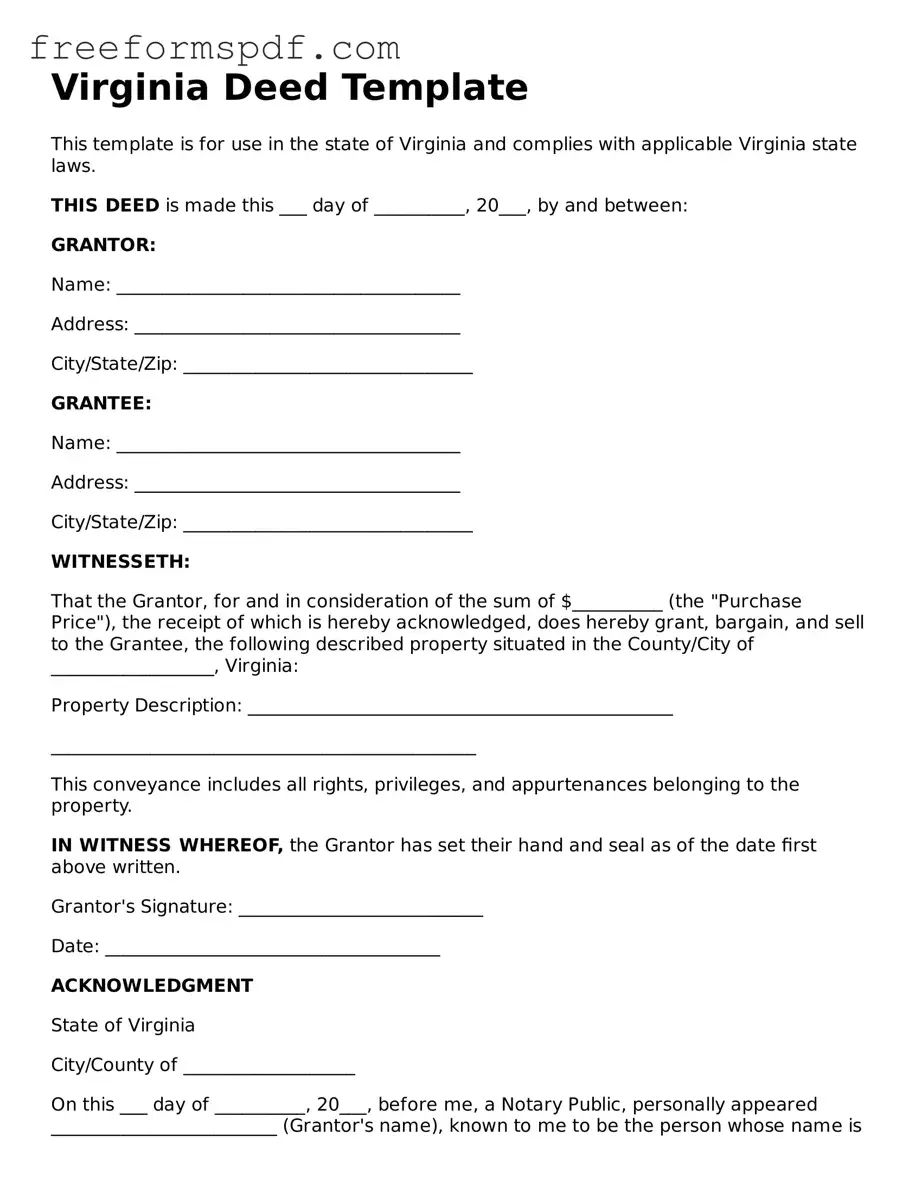Attorney-Verified Deed Document for Virginia State
Common mistakes
-
Incorrect Names: One of the most common mistakes is misspelling names or using incorrect legal names. It’s crucial to ensure that all parties involved are identified correctly. This includes checking for middle names or initials, as these can affect the validity of the deed.
-
Improper Descriptions of Property: Another frequent error involves the description of the property being transferred. A vague or incomplete description can lead to confusion or disputes later. Always provide a detailed description that includes the property’s address, boundaries, and any relevant identifiers, such as parcel numbers.
-
Failure to Sign or Notarize: A deed must be signed by the grantor, and in Virginia, it also requires notarization. Forgetting to sign or having an unnotarized document can render the deed invalid. Always double-check that all necessary signatures are present and that the notary has completed their section properly.
-
Incorrect Filing: After completing the deed, it must be filed with the appropriate local government office. Some people mistakenly believe that the deed is valid once signed and notarized. However, without proper filing, the deed does not officially transfer ownership. Ensure you know the correct office and follow their filing requirements.
Learn More on This Form
-
What is a Virginia Deed form?
A Virginia Deed form is a legal document used to transfer ownership of real property from one party to another within the state of Virginia. It serves as proof of the transfer and includes essential details such as the names of the parties involved, a description of the property, and any conditions or restrictions associated with the transfer. The deed must be signed, notarized, and recorded with the local county clerk to be legally effective.
-
What types of Deeds are available in Virginia?
In Virginia, several types of deeds can be used, including:
- General Warranty Deed: This type offers the highest level of protection to the buyer, guaranteeing that the seller holds clear title to the property and has the right to sell it.
- Special Warranty Deed: This deed limits the seller's warranty to the time they owned the property, protecting the buyer from claims that arose before the seller's ownership.
- Quitclaim Deed: This deed transfers whatever interest the seller has in the property without any guarantees. It is often used among family members or in divorce settlements.
-
How do I complete a Virginia Deed form?
To complete a Virginia Deed form, follow these steps:
- Begin by obtaining the appropriate deed form for your transaction. Ensure it aligns with the type of deed you wish to use.
- Fill in the required information, including the names of the grantor (seller) and grantee (buyer), the legal description of the property, and any specific terms or conditions.
- Both parties must sign the deed in the presence of a notary public to validate the document.
- Finally, record the deed with the local county clerk's office to ensure it is part of the public record.
-
Are there any fees associated with recording a Virginia Deed?
Yes, there are typically fees associated with recording a Virginia Deed. These fees vary by county and are generally based on the number of pages in the document. Additionally, some counties may charge a transfer tax based on the property's value. It is advisable to check with the local county clerk's office for the exact fees applicable to your situation.
Misconceptions
Understanding the Virginia Deed form can be challenging, and several misconceptions often arise. Here are seven common misunderstandings about this important document:
- All Deeds Are the Same: Many people believe that all deeds serve the same purpose. In reality, there are different types of deeds, such as warranty deeds and quitclaim deeds, each with its specific use and legal implications.
- A Deed Must Be Notarized: While notarization is often required for a deed to be valid, it is not always necessary. Some deeds may be valid without a notary, depending on the circumstances and local laws.
- Only a Lawyer Can Prepare a Deed: Some think that only attorneys can draft a deed. However, individuals can prepare their own deeds, provided they understand the requirements and format needed in Virginia.
- Deeds Are Permanent and Unchangeable: Many believe that once a deed is recorded, it cannot be changed. In fact, deeds can be amended or corrected under certain conditions, allowing for adjustments to be made.
- A Deed Automatically Transfers Ownership: While a deed is a critical document for transferring property, the actual transfer of ownership may require additional steps, such as recording the deed with the local government.
- All Deeds Need to Be Recorded: Some people think that every deed must be recorded to be valid. While recording a deed is advisable for public notice, it is not always a requirement for the deed to be legally effective.
- Deeds Are Only for Real Estate: Many assume that deeds are only related to real estate transactions. However, deeds can also be used to transfer personal property, such as vehicles or valuable items.
Being aware of these misconceptions can help individuals navigate the process of creating and understanding Virginia Deed forms more effectively.
Some Other Deed State Templates
Clark County Register of Deeds - Title insurance may relate to the conditions stated in the Deed.
Deed Form - When transferring property as part of a divorce settlement, a deed can outline specific terms agreed upon by both spouses.
In addition to serving as a proof of purchase, the New York Trailer Bill of Sale form can be easily accessed and downloaded from newyorkform.com/free-trailer-bill-of-sale-template/, allowing sellers and buyers to ensure a smooth transaction that meets all legal requirements for the transfer of a trailer's title.
Property Owners Search - May include a clause for future conveyances of property.
What Does a House Deed Look Like in Pa - Can include language addressing future property use.
